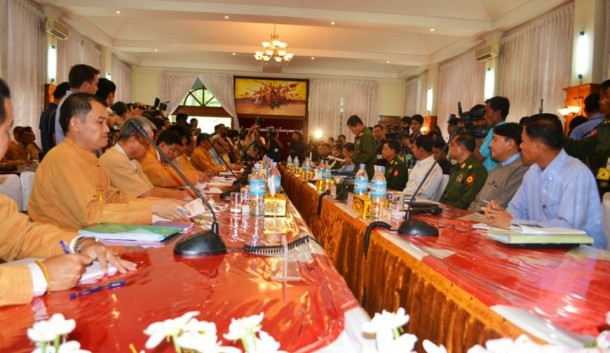The Shan State Army-South (SSA-South) has accused the Burmese government of jeopardizing a fragile peace agreement by failing to control its troops after a rebel base was torched on June 16.
This is the second clash since Deputy Commander-in-Chief Gen Soe Win signed a peace agreement with the SSA-South on May 16. Government troops from Light Infantry Battalions 225 and 65, a joint force based in Mongton Township, reportedly attacked a Shan rebel base in Ponpakyin Village.
“They attacked our base at around 10 am [local time]. Our troops withdrew from the base after defending against their offensive for around one hour,” said SSA-South spokesman Maj Sai Lao Hseng. “After they took our base, they burned downs our barracks.”
No casualties were reported from the fighting, according to Sai Lao Hseng, who added that the Burmese military ordered the SSA-South to move the base around a week before the attack.
The Shan rebels said that they had a general understanding with the government peace committee about the location of bases and control issues after several rounds of peace talks, but a concrete agreement is not yet in place with regards certain detailed matters.
The SSA-South leadership believes that the latest skirmish occurred as government troops on the ground did not want to see the rebels influencing local Shan people and even worried that they may lose control at the village after the ceasefire was signed.
“They do not want to see that we have influence on our people and this is why we think they occupied our base—to make us stay away from our people,” said Sai Lao Hseng.
The SSA-South has already opened liaison and business offices in Taunggyi, Kentung, Tachilek and Muse after meeting Naypyidaw’s peace committee last month.
But government troops earlier attacked the SSA-South at Ponpakyin Village on May 23 just a week after the two sides engaged in peace talks in the eastern Shan State town of Kengtung.
Railways Minister Aung Min, who acts as the government’s leading peace negotiator, told the SSA-South that he would not allow such clashes to occur again.
“They give explanations about how they would not let it happen again after attacking our troops. But they attacked us again when they could not order our troops to move the base as they wanted,” said Sai Lao Hseng.
The SSA-South has sent another letter to Aung Min which asks for a detailed explanation about how fighting can continue while a peace agreement has been signed.
“For us, we do not want to be fighting each other. We are ready to solve armed conflicts on the negotiating table as we have already set up our liaison offices in the towns,” said Sai Lao Hseng. “To build trust is important. If they do not believe that and keep using their armed forces, unnecessary conflicts will occur again.”
A preliminary ceasefire was signed by representatives of the SSA-South and Aung Min in Taunggyi Township on Jan. 16, yet there have nevertheless been around 20 clashes since this time.
Forces from either side must inform the other before traveling in enemy-controlled areas, according to the ceasefire agreement. However, government troops did not give any prior warning that they were entering rebel-held territory before the weekend clash, claims the SSA-South.
Burmese opposition leader Aung San Suu Kyi used her belated Noble Peace Prize acceptance speech in Norway on Saturday to emphasis that all the different ethnicities of Burma must come together in a true spirit of union.
“Since we achieved independence in 1948, there never has been a time when we could claim the whole country was at peace,” said Suu Kyi. “We have not been able to develop the trust and understanding necessary to remove causes of conflict.
“In recent months, negotiations between the government and ethnic nationality forces have been making progress. We hope that ceasefire agreements will lead to political settlements founded on the aspirations of the peoples, and the spirit of union.”
















